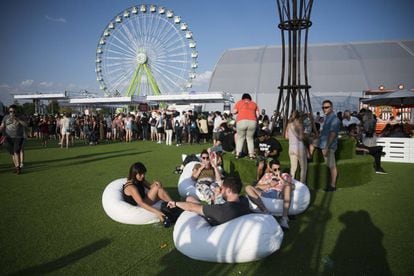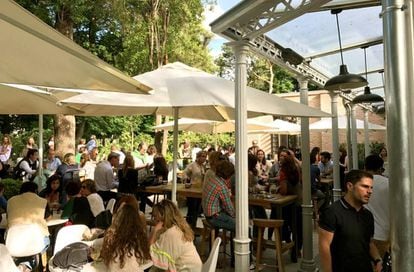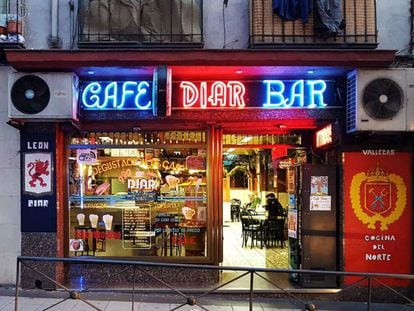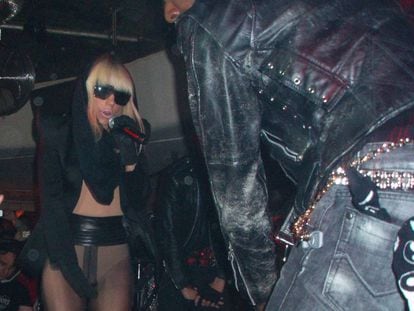Less drinking and earlier nights: Is the party over for Madrid’s nightlife?
Entertainment venues in the city are being forced to adapt their business model as consumer behavior changes


It’s 4am and Madrid’s iconic Moby Dick bar and concert hall doesn’t have anyone to serve drinks to. It’s Friday and everyone already gone home despite the fact that the bar doesn’t close until 6am. The same thing happens every weekend. Patrons come early, carefully choose what they want to drink and go home much earlier than their predecessors did a decade ago. Habits have changed, and Madrid’s late-night reveling has moved to the afternoon. It would seem that the other city that never sleeps has started to go to bed earlier.
“Our potential customers are the same as always, they’ve grown up with us, and now they have to reconcile their family and work life with leisure time,” explains Hugo García, communications director for Moby Dick, which has been open for 27 years. Leisure time hasn’t died, he says, but it has changed because of other obligations. “Birth rates in the region in 1973, when I was born, were double what they were a decade later. This has a lot to do it with it. There aren’t as many young people,” explains García.
People who are 40- or 50-years-old want to continue enjoying live music, but for one reason or another they’ve had to change their habits Hugo García, communications director for Moby Dick
At the beginning of the 1970s, 90,000 children were born in Madrid, while in the 1980s, barely 60,000 were born, according to census data from the region. “People who are 40- or 50-years-old feel young and want to continue enjoying live music, but for one reason or another they’ve had to change their habits,” says García.
Clubs, party venues, bars, theaters, musicals, festival and cultural event producers, flamenco venues and open air festivals account for more than 2,600 companies in the Madrid region. The recreational sector employs more than 20,800 people and represents 1.6% of the region’s GDP, generating €3.5 billion a year. More than seven million Madrid residents and 3.3 million foreigners enjoy the region’s entertainment sector. Indeed, 50% of international tourists who visit the region go to an entertainment venue.

Moby Dick, located in the city’s Castellana business district, is just one of the venues that has had to reinvent itself to stay afloat. During the day, to appeal to parents and their children, the bar offers live music and higher-quality drinks. “Now people take care of themselves more. In the winter they’ll come in at 7pm and choose a premium drink, which before didn’t matter. They’ll pay more for their cocktail, drink less and go home earlier so they can play sports on Sunday.” The Irish Rover, a neighboring bar that belongs to the same chain as Moby Dick, has responded to the change in demand by offering activities such as quiz nights, magic shows, micro theater and live painting events.
Guillermo Bragado, vice president of the business association Noche Madrid, told members at a meeting last week that the new way to have fun “is increasingly daytime, cultural and family oriented, more diverse and inclusive. Business models need to be updated according to new consumer habits, the segmentation of tastes by ages and profiles, and new digital communication channels, which have left behind traditional advertising tools.”
The new way to have fun is becoming more cultural and family oriented, more diverse and inclusive Guillermo Bragado, vice president of Noche Madrid
Morning family concerts, organized parties in the park and after-work drinks are becoming increasingly popular in Madrid. The modernization of cabaret, the Sunday-morning brunch phenomenon, a new boom in flamenco venues and the fusion of leisure and gastronomy are other trends that will shape the entertainment sector over the next few years, say recreation associations.
Nacho Fernández, general director of Florida Retiro, a cultural center located in El Retiro park, agrees with this outlook. His space, which is made up of four restaurants, multiple courtyards and a venue offering cabaret shows and dinner, opened in 2016 with the intention of “covering the entire spectrum of time. Before, you only went out dancing at night. Now, patrons can do other things. They can enjoy a gin and tonic at an outdoor table at any time, drink a vermouth at midday, or see a show while enjoying our food options. We followed a model that has been implemented in Europe for years,” says Fernández.

Entertainment venues are looking to diversify their offerings to stop from going under. Ramiro Ferreira, for instance, has adapted the program at his theater Essential Flamenco. Today, the theater, which has been open for four years, offers earlier showtimes. “Now we have one at 8.30pm, when before flamenco venues were open all night and on various days.” Most of his audience is non-Spanish. “Locals think that flamenco is for tourists, and so 95% of our customers are foreigners. It’s a pity and it seems to be difficult for flamenco to be recognized as an art in Spain,” he says. But Ferreira has tried to stay true to the roots of flamenco. “Other [flamenco venues] offer food while the artists dance. I see this as a lack of respect. Nobody would think of eating during an opera in Milan. What we offer are quality cocktails and shows with recognized artists. We have a show that starts earlier so that customers can leave early.”
The entertainment sector is changing, but it is surviving. Madrid offers variety of different options that can be enjoyed at any time of the day. The clubs are losing their dominance. There are fewer young people, but the older generations are not giving up their social life. Be it during the day or the afternoon, the practice of visiting bars, outdoor restaurant and parks is here to stay in the Spanish capital.
Outdated regulation
Business owners want regulations to be updated to allow clubs, party venues and theater restaurants to put on activities in the morning so that there can be a greater intersection between entertainment, culture, food and shows.
"The current licensing system is outdated, it has not been renewed since the 1970s," says García from Moby Dick. "The catalog of activities depends on the region and its application on City Hall and the two have not reached an agreement."
English version by Asia London Palomba.












































